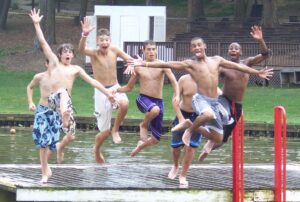
 Today’s kids spend more time on screens than any generation before them. Even when they’re not actively using a phone, many report feeling pressure to stay updated, respond quickly, or keep up with what friends are posting. For some children, this leads to stress, social anxiety, and constant comparison.
Today’s kids spend more time on screens than any generation before them. Even when they’re not actively using a phone, many report feeling pressure to stay updated, respond quickly, or keep up with what friends are posting. For some children, this leads to stress, social anxiety, and constant comparison.
That’s why one of the greatest gifts of summer camp is the ability to hit the reset button. A truly screen-free camp removes the pressure, distraction, and social noise of the online world—so kids can reconnect with friends, nature, and themselves.
This guide breaks down why camp is such a powerful antidote to phone-driven stress and how it helps children build confidence, emotional balance, and stronger friendships. For parents comparing camp models or readiness, these resources may also help:
- How Summer Camp Builds Social Skills Better Than School
- Outdoor Learning: Why Nature-Based Camps Build Confidence
- Is My Child Ready for Day Camp?
1. Why Kids Feel Anxious When Phones Are Always Present
Researchers have found that constant phone presence—even when not in use—raises anxiety levels. Kids today experience:
- Fear of missing out (What are friends doing without me?)
- Social comparison (Why does everyone else seem happier?)
- Notification stress (What if I don’t respond fast enough?)
- Screen dependency for entertainment, comfort, and stimulation
- Reduced offline confidence in conversations and friendships
When phones become part of every social interaction, kids lose opportunities to practice independence, try new challenges, and develop face-to-face communication skills.
Camp disrupts this cycle immediately—and powerfully.
2. The “Phone-Free Zone” Effect
At strong day camps, phones stay home. This creates an environment where kids can:
- Focus on real people instead of screens
- Experience success based on effort and participation
- Feel free from judgment and comparison
- Interact naturally without filtering themselves
- Try new activities without worrying about how it looks online
For many campers, it’s the first time they’ve gone hours—sometimes entire days—without thinking about what’s happening on their device.
3. Camp Activities Naturally Replace Screen Time
When kids are bored at home, the simplest solution is grabbing a device. Camp eliminates boredom through:
- Outdoor games and sports
- Creative arts & crafts projects
- Hands-on STEM experiences
- Boating, swimming, or nature exploration
- Performing arts, music, and camp events
Because the day is structured and full, screen cravings fade quickly. Kids simply have too much to do, too many people to talk to, and too many things to experience.
If you want to see how this ties into social development, check out How Camp Builds Social Skills Better Than School.
4. No Social Media = Lower Social Pressure
Many kids—especially preteens—experience:
- Pressure to look a certain way
- Fear of being judged online
- Stress about posts, likes, or streaks
- Sensitivity to gossip or friend drama
Camp removes all of it.
With no photos, videos, or messages to keep up with, kids experience friendships that are:
- More genuine
- Less performative
- More inclusive
- Based on real interactions
For many campers, this is the happiest and most emotionally balanced they feel all year.
5. Outdoors = Mental Reset + Emotional Breathing Room
Being outdoors naturally relieves stress and helps kids feel grounded. Studies show time in nature improves:
- Focus and attention
- Emotional regulation
- Mood stability
- Physical energy
- Confidence in social situations
Outdoor play also offers endless conversation starters—something that helps shy or anxious kids feel more comfortable connecting.
For a deeper dive into nature’s confidence effect, see Outdoor Learning: Why Nature-Based Camps Build Confidence.
6. Counselors Help Kids Navigate Social Moments in Real Time
When kids aren’t staring at screens, counselors have more opportunities to support:
- New friendships
- Teamwork and cooperation
- Conflict resolution
- Positive group behavior
- Confidence during group activities
Staff are trained to help kids navigate tough social interactions with guidance, compassion, and encouragement.
7. The Reset Lasts Longer Than Summer
Parents often report that after a screen-free summer:
- Kids rely less on phones for entertainment
- They show more patience and creativity
- They reconnect with offline hobbies
- They are more talkative and communicative
- Their overall mood improves
Phone anxiety may not disappear completely—but camp gives kids the tools and confidence to manage it much better.
Related Questions Parents Often Search
- “Does camp help with screen addiction?”
- “Will my child survive a phone-free camp?”
- “How does camp reduce anxiety?”
- “What happens when kids unplug for a summer?”
- “Is screen-free camp good for mental health?”
Frequently Asked Questions
Can summer camp help reduce phone addiction?
Yes. Camp breaks habitual screen-checking patterns and replaces them with real-world activities, friendships, and experiences. Many kids discover they don’t miss their phones nearly as much as expected.
What if my child is anxious about being without their phone?
This is very common—and usually temporary. Counselors help ease the transition with engaging activities, structured routines, and supportive group environments.
Are screen-free policies realistic for today’s kids?
Absolutely. Most campers adjust within the first day or two because the camp schedule keeps them busy, social, and active.
Does screen-free time really improve mental health?
For many kids, yes. Reduced comparison, less social pressure, more physical activity, and deeper face-to-face friendships all contribute to improved emotional balance.
How can I prepare my child for a screen-free summer?
Talk about what to expect, practice small phone-free periods at home, and remind them of the fun activities and friends waiting for them at camp.
Related Articles
If you’d like to see how a screen-free New Jersey camp operates day-to-day, you can schedule a tour, email fun@libertylakedaycamp.com, or call 609-499-7820.

 Schedule A Tour
Schedule A Tour Contact Us
Contact Us